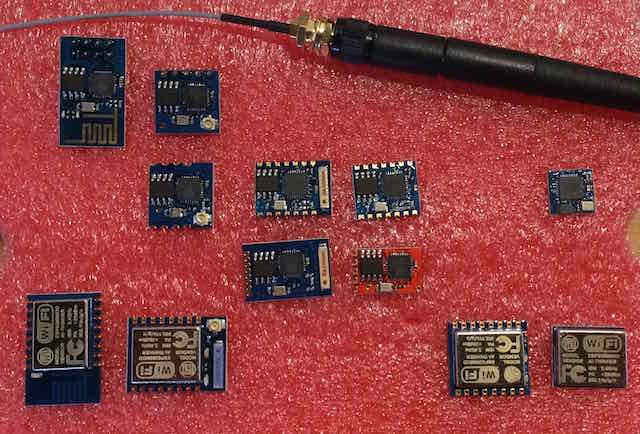- Overview
- Workshops
- Standalone examples
- Skeleton framework
- Applications
- ESP8266 NodeMCU Firmware
- ESPkit-01 hardware
- License
This repository supports a series of ESP8266 workshops focused on NodeMCU, first run at the Connected Community HackerSpace (Melbourne) on Wednesday 2015-03-11.
The Skeleton framework for developing networked NodeMCU modules and associated applications are generally useful beyond the workshops.
Each workshop consists of preparation recommendations and a presentation.
- Workshop 1: Introduction to ESP8266 and NodeMCU
- FUTURE Workshop 2: ESP8266 NodeMCU applications
- FUTURE Workshop 3: ESP8266 native C applications
These simple examples are used in Workshop 1 to demonstrate basic NodeMCU functionality for attaching a button, LED or WS2812B RGB LEDs to an ESP8266. These examples don't use the Wi-Fi network.
The Skeleton framework is a small collection of Lua modules that provide a simple modular approach to developing NodeMCU ESP8266 applications.
The Skeleton framework looks after setting up the Wi-Fi network in a location independent fashion and separates configuration from application code. The Skeleton framework also supports developing code first as Lua source files, then using node.compile() for production (saving valuable heap memory).
Use of the Skeleton framework is introduced in Workshop 1.
Applications are Lua modules that rely on the Skeleton framework to look after configuration and Wi-Fi set-up. Each individual application can focus on the specific functionality without having to duplicate basic infrastructure over and over again.
Some of the applications are introduced in Workshop 1.
Download this version of the NodeMCU firmware development branch built on 2015-02-28 with WS2812B RGB LED support.
Install on your ESP8266 using esptool (or similar) as follows ...
esptool.py -p $SERIAL_PORT write_flash 0x00000 nodemcu_dev_0x00000.bin 0x10000 nodemcu_dev_0x10000.bin
Standard pre-built versions of the NodeMCU firmware master branch can be found over here.
Rather than hand-making a cable to connect your ESP-01 to a USB-serial adapter, John Spencer's ESPkit-01 circuit board is a useful time-saver.
The NodeMCU ESP8266 workshop documentation by Geekscape Pty. Ltd. is licensed under a Creative Commons Attribution-NonCommercial 4.0 International License based on a work at https://github.com/geekscape/nodemcu_esp8266
The NodeMCU ESP8266 workshop software and examples by Geekscape Pty. Ltd. is licensed under the GNU LGPL V3 License
If these licenses prevent you from utilizing these materials, please contact me.
